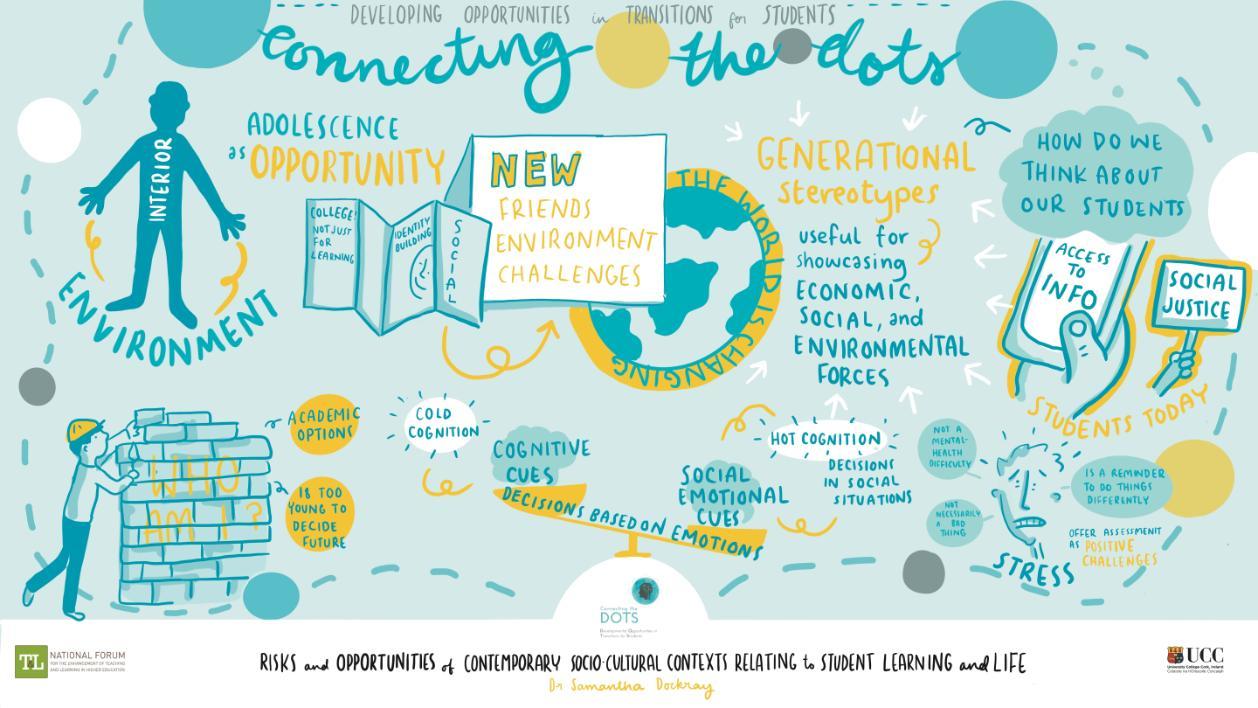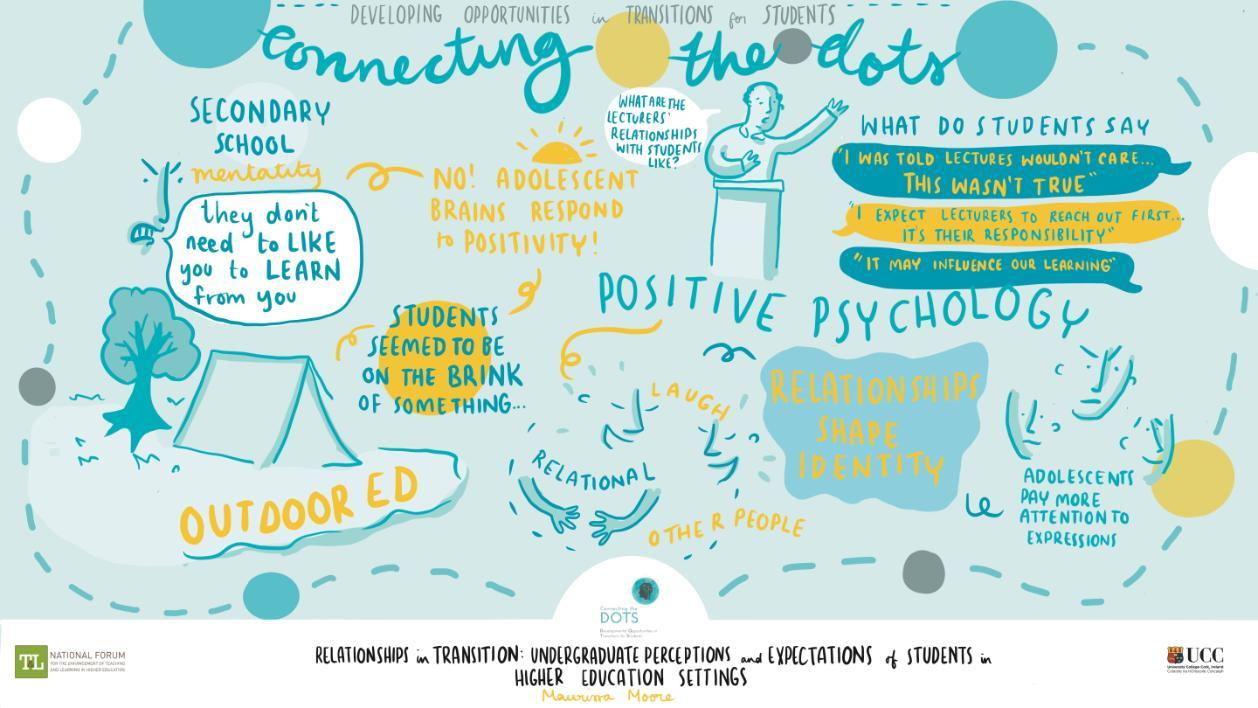Developmental Opportunities for Transitions in Students
A reflective summary of the ‘Connecting the DOTS Seminar’
Bookended by puberty and culturally defined adult roles, it is now established that adolescence extends from age 10 to age 24. The inner workings of the adolescent brain and how these workings develop and are expressed in behaviours and engagement with the external world have been the focus of an explosion of research inquiry. Seated in the pre-frontal cortex of the brain, cognitive abilities such as decision-making, planning, self-control, social interaction and self-awareness only develop by the mid-twenties. In addition, the brain regions governing risk-taking and reward are intensely active in adolescence, and so influence behaviour, which is also shaped by context and expectations of others.
 To realise student success, higher education institutions must take into account that the majority (88% in 2017/2018) (HEA, 2018) of their students are still adolescents, and are still developing their cognitive, social, emotional and self-regulatory capacities, living and learning in a socio-cultural environment that offers less external regulation than ever before. The knowledge that many students in higher education are in developmental transition spotlights opportunities to construct academic and campus contexts that supports this transition.
To realise student success, higher education institutions must take into account that the majority (88% in 2017/2018) (HEA, 2018) of their students are still adolescents, and are still developing their cognitive, social, emotional and self-regulatory capacities, living and learning in a socio-cultural environment that offers less external regulation than ever before. The knowledge that many students in higher education are in developmental transition spotlights opportunities to construct academic and campus contexts that supports this transition.
Drawing on this knowledge, and expertise in occupational science/therapy, psychology and neuroscience, the ‘DOTS – Developmental Opportunities for Transitions in Students’ seminar sought to inform stakeholders of the biobehavioural transitions that influence undergraduate wellbeing and academic achievement in the current socio-cultural climate. The seminar was convened by Dr. Eithne Hunt (Occupational Science & Occupational Therapy / Graduate Attributes Programme, UCC), Dr. Samantha Dockray (Applied Psychology, UCC; Biology, Emotions and Transitions Lab) and Professor Yvonne Nolan (Anatomy & Neuroscience, UCC). Maurissa Moore, (MA AP Coaching Psychology) also presented her research on ‘Relationships in Transition: Undergraduates perceptions and expectations of the student -lecturer academic relationship’.

Sixty-four attendees gathered across academic and professional services and HEIs nationally. Presentation topics ranged from brain development in adolescence, to risks and opportunities relating to student life, and practical strategies for enhancing student success. Cross-sector participation was facilitated through panel discussion which included student voices. Opportunities for HE staff and structures to leverage the potential of developmental transitions that influence academic experiences and graduate attributes were discussed. The seminar was well received by staff across a range of disciplines, in particular, attendees commented on the range of perspectives presented, the strong evidence-base, and the applied value of the content presented, as it relates to the students’ experience in HEIs.
‘Well organized and relevant. Inspiring and practical.'
'More educators and students need this information.'
'Truly one of the most beneficial professional development experiences I have had and contributed to in my career.’
Highlights of the seminar can be viewed here: https://www.youtube.com/channel/UCjfNujMIsb0JUNzaenNyJog
‘The seminar was clearly structured and took a comprehensive view of
teaching and learning for emerging adults.'
'The individual talks were engaging and evidence-based with clear
questions about how to incorporate learning enhancement.’
We would like to express our thanks to all those who helped to facilitate the seminar, those who attended on the day, and in particular to the National Forum for the Enhancement of Teaching & Learning in Higher Education for their support and funding.
Building on this seminar and with support from the National Forum for Teaching & Learning Strategic Alignment of Teaching and Learning Enhancement Funding in Higher Education 2019 and 2020 , we have developed a digital badge, ‘Brainpower – Harnessing the power and potential of the adolescent brain for enhanced student learning and success’ which will be made available to academic staff and academic support staff across UCC. We are also in the process of developing ‘Your Brainpower – Harnessing the power and potential of the adolescent brain for enhanced student learning and success’, which will offer students the opportunity to learn about how changes in the brain may impact their learning and experiences, as they transition through HEIs.
For further information, please email brainpower@ucc.ie
The Connecting the DOTS Seminar described the development and changes in the brain, social and cultural environments and experiences of people in late adolescence and early adulthood, with specific reference to the university environment. The event was part of the 2021 National Forums Seminar Series, funded by the National Forum for the Enhancement of Teaching and Learning in Higher Education.
For more on this story contact:
Dr Samantha Dockray s.dockray@ucc.ie
